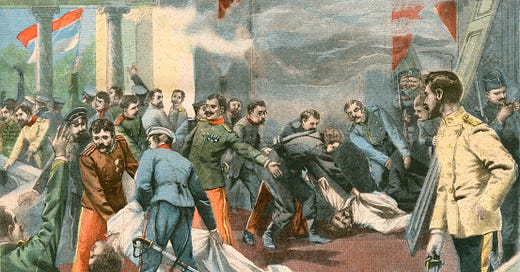Assassination of King Aleksandar I and Queen Draga in Belgrade, 10–11 June 1903 - Le Petit Parisien (1903)
“Too often today, the history of Serbia is reduced to the background to the Wars of Yugoslav Succession in the 1990s," writes Marko Attila Hoare in the opening pages of his new history of the country - published today by Hurst.
Except for a few infamous months in 1914, that was the limit of my knowledge until I read Serbia: A Modern History - Hoare's exhaustive political history from the uprising against the Ottomans in 1804 until the collapse of the first Yugoslavia in 1941.
Listen to the podcast on …
New Books Network
Apple
Spotify
Seventeen years in the making, the book had to be split in two. "I realised, when I was researching, that you simply couldn't understand this later period without understanding the previous period. Then, I had the idea of writing a general history covering the entirety of modern Serbian history from 1804 until the present day. And then it simply became too big for that," Hoare told me in a New Books Network interview.
For a Western European reader, it's an extraordinary tale of a disparate people without a defined border, of a chronic struggle between competing elites - often defined according to their cultural and diplomatic allegiance or opposition to Turkish, Austrian, or Russian imperial capitals - and of a brutal game of thrones between two self-made dynasties inter-mingled with modern political-party formation.
For those readers perplexed by how Liberal, Old Liberal, Independent, Constitutionalist, Progressive, and Radical parties aligned with princes and empires, Hoare provides a modern-day comparison. “I think this division in Serbia is perhaps more understandable for us Western audiences today than it would have been 20 years ago … Today, you have left-liberals and they believe in, for example, LGBT rights and kindness towards refugees and rights for ethnic minorities. And then, on the other hand, you have populists who will say these left-liberals are really elitists, their ideology is trying to deny the power of ordinary people ... the silent majority. So, this kind of framework is perhaps better than straightforward 'left and right' for understanding Serbian politics ... You have two camps. You have elite modernisers, who want to modernise the country along European lines, build a kind of modern state, and ultimately believe in individual freedom. And then you have the populists, which came to be embodied in the Radical Party, who believed in democracy, power to ordinary people, and power to the peasants. They didn't care much about individual freedom. They weren't so concerned about things like the rule of law but they were in favour of genuine popular sovereignty, local control of your municipality, your local government, and taxes … From a point of view of today's perspective, both camps were in some ways, if you like, left-wing". The system’s inherent fragility culminated in a palace coup in 1903 and a decade of superficial democratic peace underpinned by rival Praetorians – the Black Hand and White Hand – and their competing expansionist visions.
Although he is the author of four books on Bosnia and worked as a researcher on the case against Slobodan Milošević in The Hague, Hoare warns against demonising Serbia. “I really object to the idea that there are some nations that are good and some nations that are bad … People tend to want to think that their own country is the good country, and their opposing country is the bad country. And then you have people on the fringes who reverse that: people like Tucker Carlson or Noam Chomsky, who will flip that round and say that our country is the bad one and the opposing country is a good one. But … we all know, if we're at all objective, that every country, which has the capacity to do so, has been capable of oppressing others and being aggressive and expansionist. I wanted to avoid any kind of essentialising of Serbian history - to reduce the entirety of Serbian history to what happened in the Nineties”.
For my Writers’ Writers tip sheet, Hoare chose The National Question in Yugoslavia: Origins, History, Politics by Ivo Banac (Cornell University Press, 1984) and Stillborn Republic: Social Coalitions and Party Strategies In Greece, 1922– 1936 by George Mavrogordatos (University of California Press, 1992).






The magic of AI.
Nice sound balance on the podcast, and as you say a few times an amazing national history.